[Note: I had not dared to share this blog post of December 14 while I was still in Cuba.]
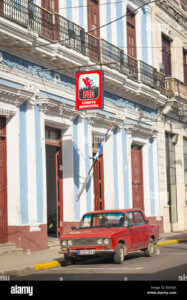
PHOTO: DOV MAKABAW/ALAMY
While walking around Cienfuegos I came across the offices of the official Cuban Communist Party (PCC) and made an appointment to speak to the Political Director for the following day, hoping to get an official perspective of Cuba’s plans to extricate itself from the current economic crisis.
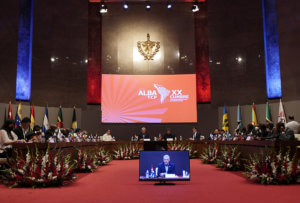
PHOTO: ALBA-TCP
Coincidentally, at the same time in Havana, the “heads of State and Government and the Heads of Delegations of the countries of the Bolivarian Alliance for the Peoples of Our America/Peoples’ Trade Treaty (ALBA-TCP),” were meeting in Havana to commemorate the 17th Anniversary of the Alliance. On my hostel room television, I was able to watch some of the speeches. There was Cuban President Diaz-Canel (boring, read from prepared notes), and Venezuelan President Nicolas Maduro (á la Fidel, very inspiring!) I actually enjoyed the closing ceremony, which was very moving, with scores of talented youth on stage singing and dancing to a multimedia presentation behind them.
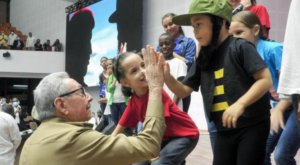
PHOTO: ALBA-TCP
Raul Castro and other dignitaries hugged some of them afterwards. 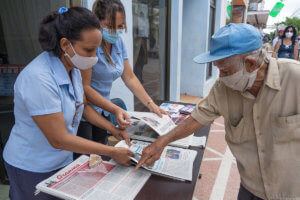 My meeting at the PCC headquarters was at 11:00 a.m. and, en route, I happened upon a table set up on the main street (Calle Boulevard) selling official newspapers. I saw the familiar 𝐷𝑖𝑎𝑟𝑖𝑜 𝐺𝑟𝑎𝑛𝑚𝑎, and three others that I didn’t recognize, so I bought them all. There was a short but useful article on ALBA in 𝐺𝑟𝑎𝑛𝑚𝑎. I remember reading the daily when I was in college, as I had subscribed to the English edition while I was a student leader on the Ohio University Student Senate. At that time I was a great admirer of Fidel Castro, and even planned to go to Cuba, thinking I might join a brigade of foreigners who would cut sugar cane, among other thing. At the appointed time at the Partido Comunista Cubano Municipal Cienfuegos, I was escorted upstairs in the ancient building, which was at that time being repaired by workers. I was to end up meeting with Jordanys Caminos Piñon (JCP), senior municipal official of the Cienfuegos PCC. Early in the interview, I was surprised when another party official, Yanilsa Dias-Rodrigues (YDR), Cienfuegos PCC Bureau Member, entered the room to join us. The interview was conducted entirely in Spanish.[i]
My meeting at the PCC headquarters was at 11:00 a.m. and, en route, I happened upon a table set up on the main street (Calle Boulevard) selling official newspapers. I saw the familiar 𝐷𝑖𝑎𝑟𝑖𝑜 𝐺𝑟𝑎𝑛𝑚𝑎, and three others that I didn’t recognize, so I bought them all. There was a short but useful article on ALBA in 𝐺𝑟𝑎𝑛𝑚𝑎. I remember reading the daily when I was in college, as I had subscribed to the English edition while I was a student leader on the Ohio University Student Senate. At that time I was a great admirer of Fidel Castro, and even planned to go to Cuba, thinking I might join a brigade of foreigners who would cut sugar cane, among other thing. At the appointed time at the Partido Comunista Cubano Municipal Cienfuegos, I was escorted upstairs in the ancient building, which was at that time being repaired by workers. I was to end up meeting with Jordanys Caminos Piñon (JCP), senior municipal official of the Cienfuegos PCC. Early in the interview, I was surprised when another party official, Yanilsa Dias-Rodrigues (YDR), Cienfuegos PCC Bureau Member, entered the room to join us. The interview was conducted entirely in Spanish.[i]
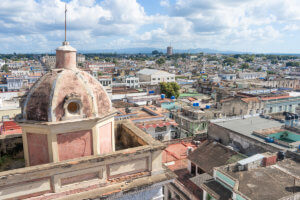
Central Cienfuegos, with the headquarters of the Cuban Communist Party in the foreground
Shortly after the appointed time at the Municipal Cienfuegos PCC, I was escorted upstairs in the ancient building, which was at that time being repaired by workers. I ended up meeting with Jordanys Caminos Piñon (JCP), senior municipal official of the Cienfuegos PCC. Early in the interview, I was surprised when another party official, Yanilsa Dias-Rodrigues (YDR), Cienfuegos PCC Bureau Member, entered the room to join us. The interview was conducted entirely in Spanish. 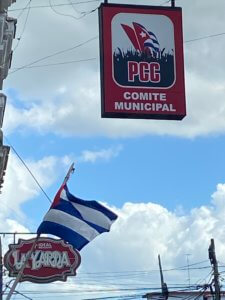 The door was shut behind us and, after I introduced myself, I was given a perfunctory welcome; I later realized that Compañero Caminos never introduced himself, which led to some confusion on my part and consternation on his. Above him and to the left, was a framed photo of Fidel Castro, omniscient as God. I said I was a simple tourist who wanted to know more about the Cuban Communist Party. I asked Caminos if I could show to him a PowerPoint sequence via my laptop. In it, I had included a few of my portfolio photos, first from other countries, and then some of my most positive Cuban scenes from the weeks before. But I had carefully excluded any of my more graphic photos of poverty. Prior to entering the room, I had turned on my iPhone audio recorder and kept the phone discreetly by my side, so the following is a verbatim transcription from the Spanish of some of the interview.
The door was shut behind us and, after I introduced myself, I was given a perfunctory welcome; I later realized that Compañero Caminos never introduced himself, which led to some confusion on my part and consternation on his. Above him and to the left, was a framed photo of Fidel Castro, omniscient as God. I said I was a simple tourist who wanted to know more about the Cuban Communist Party. I asked Caminos if I could show to him a PowerPoint sequence via my laptop. In it, I had included a few of my portfolio photos, first from other countries, and then some of my most positive Cuban scenes from the weeks before. But I had carefully excluded any of my more graphic photos of poverty. Prior to entering the room, I had turned on my iPhone audio recorder and kept the phone discreetly by my side, so the following is a verbatim transcription from the Spanish of some of the interview.
JE: I plan to share my photos with my fellow Americans, [with the idea] to improve tourism here. Because I believe Cuba has a lot to offer. But … the conditions nowadays are difficult for Cubans in economic terms, right? So what is the reason, in your mind? Is it just the blockade? Or are there others?[ii]
JCP: “All of society has it’s perfections and…its characteristics,” he began in a stentorian voice.“ Not everyone knows the history of Cuba…” [He then dove into well-tread history involving Fidel Castro and how he and a group of his comrades overcame the Batista regime.]
Dias-Rodrigues, the female PCC senior official, knocked on the door and entered room at this point.
JCP: “We have a problem also, Cuba is a country blockaded for more than 60 years, by the U.S. government…”
JE: “Would you say that Cuba is in a constant state of war because of the blockade?”
JCP: [At this point he completely removed his mask for the remainder of the interview. I felt that he wanted to have complete freedom to express himself.] “Really, there is a state of war from others against ourselves. Cuba is open to have relations with everyone. There is economic loss: four thousand million dollars lost in the Cuban economy. We have to purchase from other countries [yet] we can’t buy from many of them because of the blockade.”
JE: [interjecting] ¡Es injusto!
JCP: “¡Es injusto! Un bloqueo injusto! … tourism has developed regardless. [He brought up subject of three nuclear reactors that have been on hold for a long time, originally funded by USSR, a project which Cuba could not finish, owing to the blockade. He also mentioned the nation’s lack of petroleum, the extra-territorial blockade, and sanctions.] In spite of everything, the Revolution celebrates 63 years.”
JE: “Congratulations!”
JCP: “Perfecting the support of the People … 86 percent of Cubans are in favor of the Revolutionary plan. [He claimed the results were based upon a] ‘consulta popular’”
JE: “Was there a survey [to ascertain the percentage]?”
JCP: [He ignored my query and then detailed the impact of the blockade in various sectors – health, agriculture, in every sector. The exchange with the USA was stopped.…]
JE: [Interjecting] “Especially with the latest politician, Trump – such a cretin!”
JCP: “The politics has been exactly the same, whether Republican or Democratic…no hay ninguna diferencia”.
JE: “What about President Obama? He was much more open to Cuba….”
JCP: “Yes, under Obama there were improvements, such as in travel… [He went into the permitted categories and different types of travel, such as religious, etc. ]
JCP: “I don’t know if you heard about the demonstrations of 11 July, principally by a group of delinquents, paid by agencies subversive of the USA.”
JE: “Agencies? Are you talking about the Cuban-American association?” I was referring to the Cuban American National Foundation. CANF was formerly a strong advocate for isolation of Cuba by the USA, but in April it published an article calling for lifting U.S. restrictions on aid and travel to Cuba, and aiding civil society groups there. The foundation has been accused by the Cuban government of planning and funding terrorist attacks within Cuba.
JCP: “Yes, and with the CIA…contra-revolutionary groups based in Miami…. Not only economic but social intervention. They weren’t able to win a military war; they failed. Cuba is the only country in the world that has had a blockade with the USA. Economic development of Cuba … has advanced in spite of the blockade. Doctors lending their services in the world [such as in] Brazil [until recently]”
JE: [Interjecting] “By Bolsinaro, otro cretíno. I also saw many Cubans helping in Haiti after the earthquake 2010.”
JCP: “Cuban medics in Algeria…Venezuela, Ecuador, Nicaragua.” [He mentioned the ALBA meeting and then blamed the U.S. for forcing the medics to leave Brazil] “Where we had thousands of medicos, we were forced to remove them…. And 200 thousand medics in other countries. Commander-in-Chief [Fidel] even sent medics to the USA after Hurricane Katrina.”
After some digressions on a U.S. citizen who fought in the Cuban Revolution, he reflected, “We have to resolve the internal problems, and we have a lot!”
JE: “I know Cuba has done a lot to reduce the effects of COVID-19”
JCP: “We have a health system…”
JE: [Interjecting] “In my country – it’s a problem.”
Both interlocutors then provide details about Cuban health system, stating “It’s an integrated system…”
JE: “I know a lot about your successes. But a problem that I see is that those that receive an education in Cuba, they are leaving and emigrating. How can Cuba stop the departure [brain drain] of so many [educated] people?
JCP: “Well, you know that migration takes place in all countries, it’s natural. Logically, it’s ‘El Sueño Americano.’ Immigration to the U.S. is a ‘processo logico’.” I was surprised that he proceeded to complain that the U.S. has not complied with the promulgated annual quota to allow in more Cubans, but just some eight thousands have been allowed to immigrate each year.
“Those who receive a good education, are they receiving a [commensurate] salary?” Compañero Caminos then spoke about a mechanism that connects salaries with education but lamented that “…the blockade has impeded the advance of the economy. Cubans can have property. There is a ‘revolutionary concept’ but “… the U.S. has failed to stop us. The U.S. is a first world nation, but what about all the income disparity there?”
JE: [Interjecting] “Disigualdad!” [Inequality]
JCP: “Socialism is constructing a government to be more just and inclusive. [It is] Socialismo perfectionado. Here everyone has the same benefits: social security, health, etc.”
I tried to steer the conversation back into an area that allowed a more positive angle on Cuba, how Cuba confronting the COVID pandemic and effects.
JCP: “Very tough, here in this blockaded country, to deal with the COVID. But we have a revolution, including that we have to save human lives.” He then went into a tangent on the economic-social-political system.
JE: Have you supported other countries in the fight against COVID?
JCP: “Yes, many countries…” And he provided details.
JE: “Has COVID-19 affected the tourism sector?”
JCP: “2020, 11 March, was the first case, in [the city of] Trinidad. The pandemic has destroyed tourism.”
JE: “What occurred on Nov. 15, 2021, when Cuba reopened to tourism?”
JCP: “In 2020, there was control of the pandemic, in October and November.” [Details on the Delta variant, vaccine. “Cuba has the greatest percentage of vaccinated people … three doses; fourth dose upcoming. It’s our very own vaccine…France is ordering 24 million doses.” [On the use of face masks, washing of hands, all methods to avoid spread of virus.] Here more than eight thousand Cubans died. Very complicated situation.”
JE: “Do you believe the pandemic is under control here? Can you declare victory?”
JCP: “No! The pandemic is not under control. [More details, on the opening of Cuba on November 15 and public health controls.] “The preventive methods remain in effect.”
JE: “Cuba has confronted two enemies: a blockade and a pandemic. Do you think Diaz-Canel is providing inspirational leadership, as Fidel did?”
JCP: “The immense majority of Cubans support the revolution, prefer socialism. SOCIALISM IS IRREVOCABLE! 86 percent of the population support the Revolution. I think that, in Diaz-Canel, we have a president who has led the country forward. [YDR tries to get a word in edge-wise and is steamrolled again.] “I think I would characterize the leadership as ‘heroic’.
JE: Speaking of the 85% that is in favor of the revolution, what about the other 15%? Is there freedom of expression?”
JCP: “Freedom of expression…well not everyone is in favor of U.S. capitalism.”
JE: [Sympathetically, in order to gain his trust] “Like me!”
JCP: “One can express…but in a peaceful manner!”
JE: “What about those who march in demonstrations or are striking?” [I mime holding up a protest sign.]
YDR: “One must show respect to the Constitution!”
JCP: “Correct! The intent to demonstrate … socialism is irrevocable; the removal of socialism ‘no es permitido.’ And the demonstration was not peaceful but violent.”
JE: [Dubiously] But ‘everyone’? ‘All the demonstrators’ were violent? Is that what you are saying?
JCP: “Ok, how were they violent? Well, they threw stones, assaulted a policeman, hit police vehicles…”
YDR: [Angrily echoes him, provides other examples of violence]
JE: “But the majority were peaceful…”
Both: “Si.”
JE: “What will happen if more want to demonstrate?”
JCP: “…if it’s in a peaceful manner…”
JE: “How does socialism affect the common person, is it a remote concept? In my country the Communist party is an official party.”
JCP: “We have equality for all. [It’s] more just.”
JE: “Ok, but is that a dream?”
JCP: [On Perfecting socialism, making a society more just, rights, opportunities, etc.]
JE: “But does the typical Cuban think of himself as a communist or socialist?”
JCP: “Well to each his own.”
JE: “I saw in Havana there are elites living in mansions, rich, who are they?”
JCP: “I don’t know.”
YDR: [She tries to get in a word but is stepped on by JCP]
JCP: “People have a right to live in dignity.”
YDR: “And their family members also.”
JCP: “People can have better lives.”
JE: “Ok, so in Cuba there is no limit to wealth? What if a Cuban-American returned to Cuba with all his money?”
JCP: “The wealth that you create is your own. Socialism is the respect of persons. There are farmers who have millions [money] because they worked hard. No problem. People who have rental property – no problem. What the Revolution has instituted is that those who have their money can keep it. If a Cuban-American came back with his money, he can keep it [here].”
JE: “So it’s not like Communism of Mao, not traditional (classical) communism. This seems more Socialist than Communist.”
JCP: “Marxism-Leninism is the doctrine. And Fidel. It’s our revolution.”
YDR: “We have this capacity…”
JCP: [Interrupting] “Let the blockade be lifted. We are country that has withstood a blockade and has produced three vaccines…”
JE: That’s the message that I will give when I return. And about the richness of Cuba. So your last name is Puerta, right?
 Here, the switcheroo was revealed and Caminos corrected me, providing his full name and writing it down on a piece of paper I provided. Since the interview was concluded, I decided to ask if I can take a photo of the two of them. I said it would be great to have the Fidel portrait in the background, which seemed to throw them for a loop. Immediately, Dias-Rodrigues refused, laughing nervously. Caminos agreed but resolutely insisted on using his facemask that he be seated behind his desk. As he is arranging his papers, I sneak in a couple of photos of him in action before he formally poses. I then ask for a photo of both of us. After Dias-Rodrigues initially said she was worried to hold my camera, the photo was made; Caminos insisted I wear facemask. As we were leaving the 2nd floor, I asked if I might take some photos of the building, but was told not to, since it is being renovated.
Here, the switcheroo was revealed and Caminos corrected me, providing his full name and writing it down on a piece of paper I provided. Since the interview was concluded, I decided to ask if I can take a photo of the two of them. I said it would be great to have the Fidel portrait in the background, which seemed to throw them for a loop. Immediately, Dias-Rodrigues refused, laughing nervously. Caminos agreed but resolutely insisted on using his facemask that he be seated behind his desk. As he is arranging his papers, I sneak in a couple of photos of him in action before he formally poses. I then ask for a photo of both of us. After Dias-Rodrigues initially said she was worried to hold my camera, the photo was made; Caminos insisted I wear facemask. As we were leaving the 2nd floor, I asked if I might take some photos of the building, but was told not to, since it is being renovated.
• • •
Later that day, I was relaxing just outside of my Cienfuegos casa particular as the sun was setting, glass of mango juice in my hand as I watched some neighborhood boys playing soccer across the street. I noticed a car park on the street in front of the casa and two uniformed officers emerge. They approached and asked me to identify myself, and that I would accompany them to the local Immigration station. I asked the reasons, but pretty much knew why they were there. I was concerned, but recalled my interview experience with another Immigration agent who came to my casa in Havana was perfunctory, so I tried to not worry too much. I returned to my room to retrieve my passport and facemask, and grabbed a small bottle of water. The lodging owner and his wife were curious what was going on with me, but didn’t betray any concerns. Returning outside, the back door of the four-door car was opened for me by the junior officer. We drove to the local immigration office, which – surprising to me – was just three blocks away. It was adjacent to the customs office, off the Malecón de Cienfuegos. We entered a gloomy government building, and I was instructed to hand over my mobile phone to another officer, then escorted by both officers up a circular metal staircase to a second-floor office. I thought, if I have to run, such stairs would slow me down. I guessed the senior official with two stars on his couldn’t have been more than 30 years old. He later said he was “Immigration Officer Ramiro”. We all wore our face masks and he seated himself behind a solid desk, motioning for me to take a chair across from him. The other officer and I sat across from Officer Ramiro during the entire interview. Officer Ramiro suddenly leaned forward in a confrontational manner, “What is this about you going to the PCC and asking about things, demonstrations, and all that?” I replied that I was a tourist and simply interested in having a conversation with different people in Cuba. I said that I sympathized with the Cubans and I have a long history of knowing about Cuba, even reading the Diario Granma since the ‘70s. I wanted them to know I was an ally, sympathetic to the Revolution, “Yo soy un aliado.” Officer Ramiro demanded I hand him my passport. He sternly informed me that I “must abide by the rules in my visa” pointing a few times to the document I had taped inside. “As a tourist, there are things you just cannot do!” (I later read the visa rules, which were simply to hold on to the visa and that it was required for entry to Cuba; so the officer was either bluffing or uninformed.) He kept consulting his computer screen. Although it was at an angle, I could vaguely see long paragraph of notes about me, perhaps from my entry interview and also a second interview I had had with another Immigration officer in my Havana casa. Ramiro asked me about the “donations to orphanages,” and I replied, yes, I had donated lots of toys to the poor. He thereupon admonished me, saying I could not do this either, that such things “must be approved.” He seemed skeptical that I wasn’t advised of this upon entry to Cuba or during my brief Havana interview with another Immigration official who came to my casa there. I truthfully replied that, “I didn’t know” of any restrictions, and furthermore no one had commented on all the bags of toys I had brought into the country in Customs – some seven kilos in my luggage. Ramiro demanded to know what I had studied in college, what my previous jobs had been, where I had visited in Cuba, and where on the island I was planning to go. I said I had studied Fine Arts in college, and I had been the director of a non-governmental organization, AidWEST. I doubted the officers or the government knew I had been with the State Department for nearly 11 years, since I had taken steps to hide my on line social media profiles – but at this point I wasn’t so sure! Throughout the grilling, I provided many candid comments favorable to Cuba and criticizing the blockade. At a certain point, I could see in his eyes that he downshifted and seemed to betray sympathy for my perspective. The exchange became slightly more friendly, though Ramiro always maintained his stiff demeanor. I sensed he was torn between wanting to do as he was trained, and to be friendly with me. He fretted that I would have a bad impression of Cuba, and twice encouraged me to report of all the great things the country has to offer. The interrogation ended after some 30 minutes. I was escorted back down the circular stairs and my phone was returned. Rodrigo wanted me to provide the address of my Havana casa, which I did. I was driven back and I thanked the officers. I can only surmise that I was called in for interrogation because my questions to the PCC officials made them uncomfortable. While I tried to come across as one who believed in the ideals of the Revolution, the points I made about the July demonstrations must have shaken them enough to report me to the Immigration Office. And I wondered if the PCC officials who I met with were in some hot water themselves! When I entered my casa, the owner and his mother were there and asked me what transpired. I told them and opined that tourism would suffer if tourists have to be interrogated like this. I returned to my room somewhat rattled, and immediately began backing up my photographic files and secreting them in diverse compartments in my bags. The worst outcome for me would not be that I would be briefly detained, but that all my photos would be lost. Feeling insecure, I went to bed fully clothed, sleeping fitfully. When I entered my casa, the owner and his mother were there and asked me what transpired. I told them and opined that tourism would suffer if tourists have to be interrogated like this. I returned to my room somewhat rattled, and immediately began backing up my photographic files and secreting them in diverse compartments in my bags. The worst outcome for me would not be that I would be briefly detained, but that all my photos would be lost. Feeling insecure, I went to bed fully clothed, sleeping fitfully. [i] (I was originally told the day before that I would be meeting with Political Chief Leberman Puerta and I am not sure of why a switch was made.) [ii] “Voy a compartir mis fotos con mis paísanos para engrandezca el turismo aquí. Porque creo que Cuba tiene mucho que ofrecer…Pero gostaría saber si las condiciones hoy en día son difíciles para los Cubanos, en terminos económicos, no es cierto? Pero ¿Que es el porque, en su mente? ¿Es solamante el bloqueo? ¿O hay otros?”
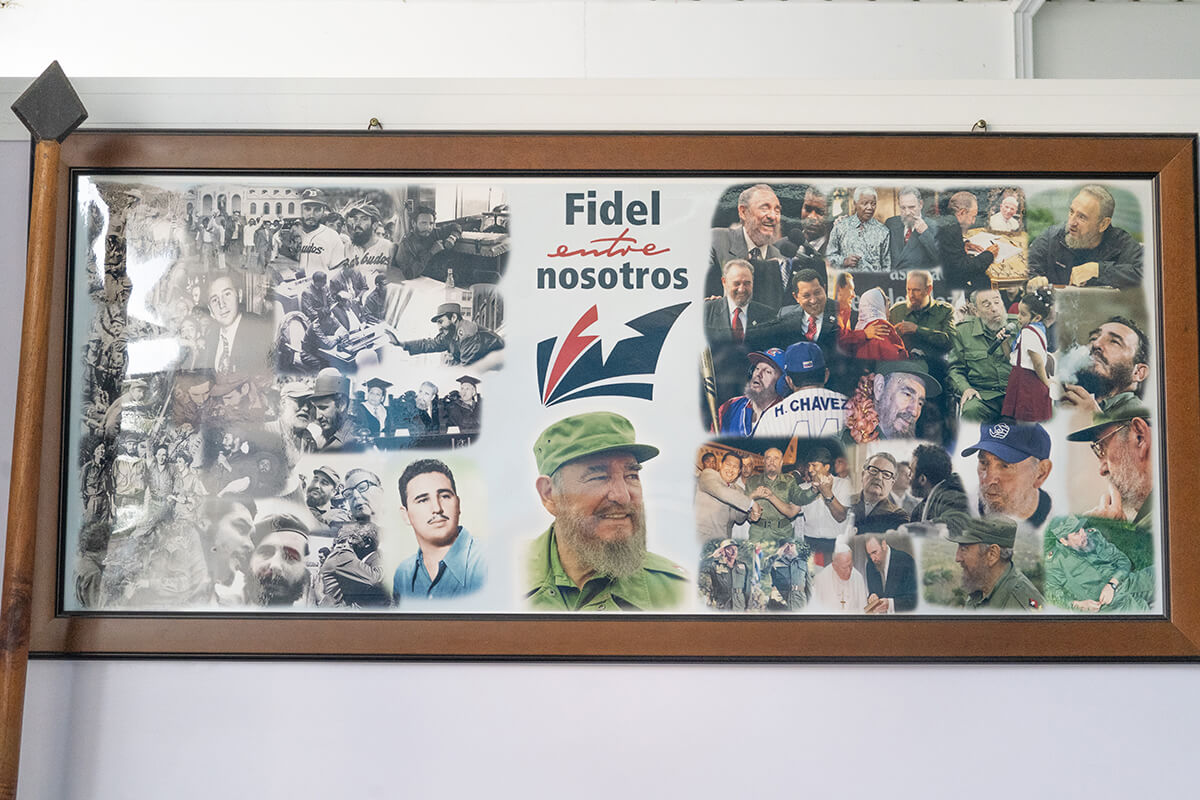
0 Comments